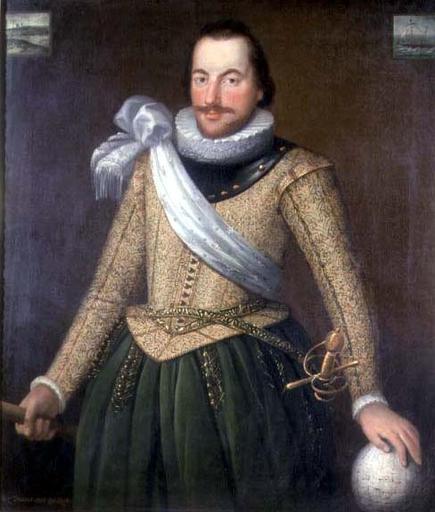MAKE A MEME
View Large Image

| View Original: | Admiral_Sir_Thomas_Button.jpg (488x575) | |||
| Download: | Original | Medium | Small | Thumb |
| Courtesy of: | www.flickr.com | More Like This | ||
| Keywords: Sir Thomas Button (died April, 1634) was a Welsh officer of the Royal Navy and Explorer who in 1612–1613 commanded an expedition that unsuccessfully attempted to locate explorer Henry Hudson and to navigate the Northwest Passage. It was, nonetheless, a voyage of discovery. Button sailed from England about the beginning of May 1612, in two ships; Resolution and Discovery and reached the mouth of a river which he named the Nelson after a member of the ships company who had died.[1] They wintered there at Port Nelson and the next year headed north to search for the Northwest Passage. They lost the Resolution to sea ice and continued on to 65° North. He discovered and named Mansel Island and returned to England in September 1613.[2] He is credited with exploring and securing the west coast of Hudson Bay for his country he named the area New North Wales and New South Wales. He continued on to have a successful naval career and became an Admiral although he had a long quarrel with the English Admiralty which was nearing resolution in his favour at the time of his death. Sir Thomas Button (died April, 1634) was a Welsh officer of the Royal Navy and Explorer who in 1612–1613 commanded an expedition that unsuccessfully attempted to locate explorer Henry Hudson and to navigate the Northwest Passage. It was, nonetheless, a voyage of discovery. Button sailed from England about the beginning of May 1612, in two ships; Resolution and Discovery and reached the mouth of a river which he named the Nelson after a member of the ships company who had died.[1] They wintered there at Port Nelson and the next year headed north to search for the Northwest Passage. They lost the Resolution to sea ice and continued on to 65° North. He discovered and named Mansel Island and returned to England in September 1613.[2] He is credited with exploring and securing the west coast of Hudson Bay for his country he named the area New North Wales and New South Wales. He continued on to have a successful naval career and became an Admiral although he had a long quarrel with the English Admiralty which was nearing resolution in his favour at the time of his death. | ||||